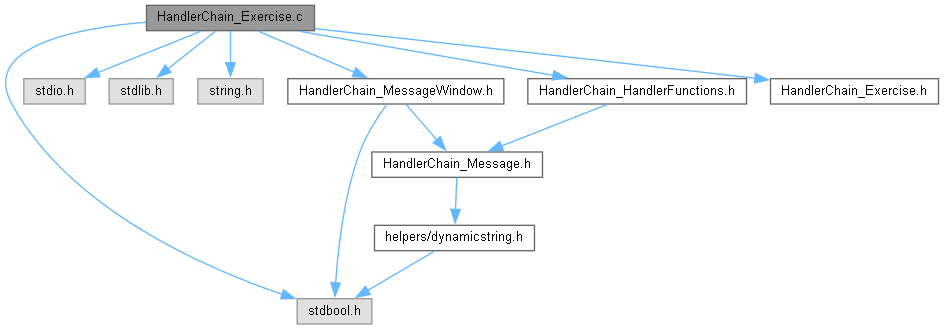Implementation of the HandlerChain_Exercise() function as used in the HandlerChain Pattern. More...
#include <stdbool.h>#include <stdio.h>#include <stdlib.h>#include <string.h>#include "HandlerChain_MessageWindow.h"#include "HandlerChain_HandlerFunctions.h"#include "HandlerChain_Exercise.h"
Go to the source code of this file.
Functions | |
| static void | _HandlerChain_ConstructWindowChain (int windowIds[3]) |
| Helper function to construct a list of windows. Messages will be passed to these windows via the HandlerChain_SendMessage() function. | |
| static void | _HandleChain_DestroyWindows (int windowIds[3]) |
| Helper function to destroy all windows that have been created. | |
| static void | _ShowHandlerChain (const char *prompt) |
| Helper function to display the current handler chain. | |
| void | HandlerChain_Exercise (void) |
| Example of using the HandlerChain Pattern or Chain of Responsibility design pattern. | |
Detailed Description
Implementation of the HandlerChain_Exercise() function as used in the HandlerChain Pattern.
Definition in file HandlerChain_Exercise.c.
Function Documentation
◆ _HandleChain_DestroyWindows()
|
static |
Helper function to destroy all windows that have been created.
- Parameters
-
windowIds List of window IDs to destroy.
Definition at line 38 of file HandlerChain_Exercise.c.
References Destroy, HandlerChain_SendMessage(), and Message_Initialize().
Referenced by HandlerChain_Exercise().
◆ _HandlerChain_ConstructWindowChain()
|
static |
Helper function to construct a list of windows. Messages will be passed to these windows via the HandlerChain_SendMessage() function.
- Parameters
-
windowIds Array of ints that will be filled in with the IDs of each window that is created so they can later be destroyed. Only 3 windows are created, hence the fixed size of the array.
Definition at line 26 of file HandlerChain_Exercise.c.
References MessageWindow_Create().
Referenced by DesignPatternExamples_cpp::HandlerChain_Exercise(), and HandlerChain_Exercise().
◆ _ShowHandlerChain()
|
static |
Helper function to display the current handler chain.
- Parameters
-
prompt A prompt to display before the handler chain.
Definition at line 53 of file HandlerChain_Exercise.c.
References DynamicString_Clear(), HandlerChain_ToString(), and DynamicString::string.
Referenced by HandlerChain_Exercise().
◆ HandlerChain_Exercise()
| void HandlerChain_Exercise | ( | void | ) |
Example of using the HandlerChain Pattern or Chain of Responsibility design pattern.
The Handler Chain pattern is used to support a dynamic list of handlers that are passed the same arguments. It is kind of the inverse of the Visitor pattern, where the Visitor pattern is a handler that is passed to all objects in a list and the Handler Chain pattern is an object passed to handlers in a list.
In this exercise, multiple rectangular regions represented by the MessageWindow structure are represented by window IDs. The IDs are kept in a list to which messages can be passed, using the HandlerChain_SendMessage() function. That function iterates through the list of window IDs and calls MessageWindow_ProcessMessage() for each ID with the desired message. MessageWindow_ProcessMessage() passes control to one of several handler functions based on the type of the message.
Definition at line 88 of file HandlerChain_Exercise.c.
References _HandleChain_DestroyWindows(), _HandlerChain_ConstructWindowChain(), _ShowHandlerChain(), ButtonDown, ButtonUp, HandlerChain_SendMessage(), and Message_Initialize().